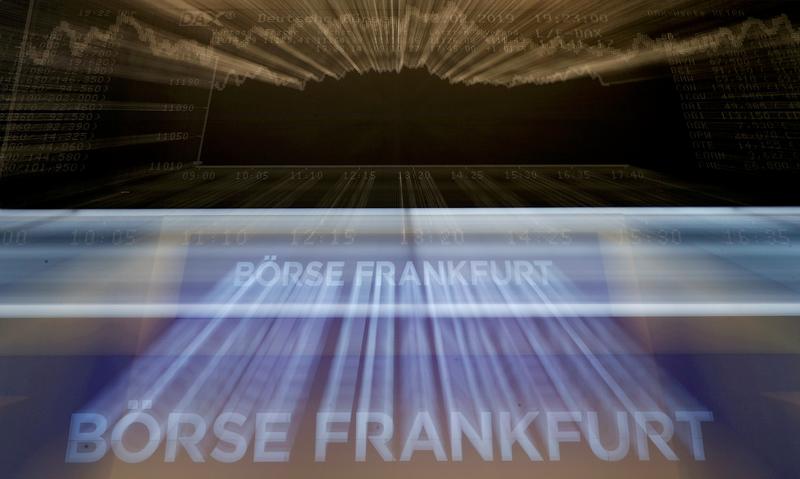WASHINGTON/MILAN (Reuters) – World stock markets fell from record highs and U.S. shares were mixed on Tuesday as mounting worries over the slowing pace of economic recovery and the impact of the coronavirus Delta variant overtook investors’ hopes the Federal Reserve will delay tapering.
Wall Street opened softer after Monday’s U.S. Labor Day holiday and the MSCI world equity index retreated from a record hit overnight, following seven consecutive days of gains to all-time highs.
That followed gains during Asia’s trading hours on hopes of extra stimulus in Japan and strong China trade data.
The Dow Jones Industrial Average fell 292.45 points, or 0.83 percent, to 35,076.64, the S&P 500 lost 19.29 points, or 0.43 percent, to 4,516.14 and the Nasdaq Composite dropped 8.90 points, or 0.06 percent, to 15,354.62 by 11:12 a.m. EDT (1512 GMT).
European stocks retraced ahead of an ECB policy meeting on Thursday. The STOXX 600 benchmark was down 0.5% but just below its lifetime peak hit in August.
“The combination of exorbitant expectations, nosebleed valuations and slowing macro environment make the go-forward reward/risk outlook less attractive,” said Jeffrey Carbone, managing director at Cornerstone Wealth in Huntersville, North Carolina.
Data on Friday showed the U.S. economy created 235,000 jobs in August, the fewest in seven months as hiring in the leisure and hospitality sectors stalled, reducing expectations that the Fed will opt for an early tapering of its monthly bond purchases.
The market took the surprisingly soft U.S. payrolls report on Friday “in stride, with the assumption that the Covid-19 Delta variant had an impact on economic activity in August,” Arthur Hogan, chief market strategist at brokerage National Holdings in New York, said in a market note.
Speeches by a number of U.S. policymakers later this week will be closely watched for any indication about how the weak jobs report has impacted the Fed’s plans on tapering its bond purchases and keep its expansive policy for the near-term.
The recent equity rally started after Fed Chair Jerome Powell’s dovish speech at the Jackson Hole Symposium in August.
“Given that before Jackson Hole many FOMC members had come out in favor of tapering on a tight timetable, we’ll see if they confirm, or align with Powell’s more moderate message,” said Giuseppe Sersale, fund manager at Anthilia.
Yields on U.S. Treasury bonds and inflation-protected securities rose on Tuesday, extending last week’s rise when data showing a jump in average wages confirmed price pressures were building in the world’s biggest economy.
Japanese shares rallied further on hopes the ruling Liberal Democratic Party will offer additional economic stimulus and easily win an upcoming general election after Prime Minister Yoshihide Suga said he would quit.
Tokyo’s Nikkei crossed the 30,000 mark for the first time since April, also helped by an announcement on its reshuffle, and the broader Topix index climbed 1.1% to a 31-year high.
Anthilia’s Sersale said investors had a defensive positioning on Japanese stocks that led to a short squeeze.
“I was positive on Tokyo (stocks) and remain so, but perhaps at this point it is better to look for a less overbought entry point,” he said.
Mainland Chinese shares extended gains, with the Shanghai Composite rising 1.5% to its highest since February, helped by Chinese trade data showing both exports and imports grew much more quickly than expected in August.
“The mood is improving on hopes the government will take measures to support the economy and that the monetary environment will be kept accommodative,” said Wang Shenshen, senior strategist at Mizuho Securities.
A rout in bonds and shares of China Evergrande Group deepened on Tuesday after new credit downgrades on the country’s No. 2 developer.
The euro was last down 0.17 percent at $1.1848, while Europe’s broad FTSEurofirst 300 index dropped 0.47 percent to 1,821.34.
The ECB is seen debating a cut in stimulus, with analysts expecting purchases under its Pandemic Emergency Purchase Programme (PEPP) falling, possibly as low as 60 billion euros a month from the current 80 billion euros.
ING strategist Chris Turner said Friday’s soft U.S. jobs report and dovish comments last month by Powell have taken “some of the sting out of the dollar’s upside.”
“Even the unloved EUR has found a few friends over recent weeks as hawks on the ECB demand a reassessment of pandemic support levels,” he noted.
Germany’s 10-year yield rose to its highest since mid-July.
The Australian dollar briefly rose after the central bank went ahead with its planned tapering of bond purchases, but quickly gave up those gains after the bank reiterated its need to see sustainably higher inflation to raise interest rates.
The Aussie was 0.74% lower, off its 1-1/2-month high set on Friday.
Oil prices fell after Saudi Arabia’s sharp cuts to crude contract prices for Asia revived concerns over slower demand.
Brent crude futures fell 0.65% to $71.78 per barrel, while U.S. crude futures declined 1.44% to $68.29. [O/R]
Source: Read Full Article
